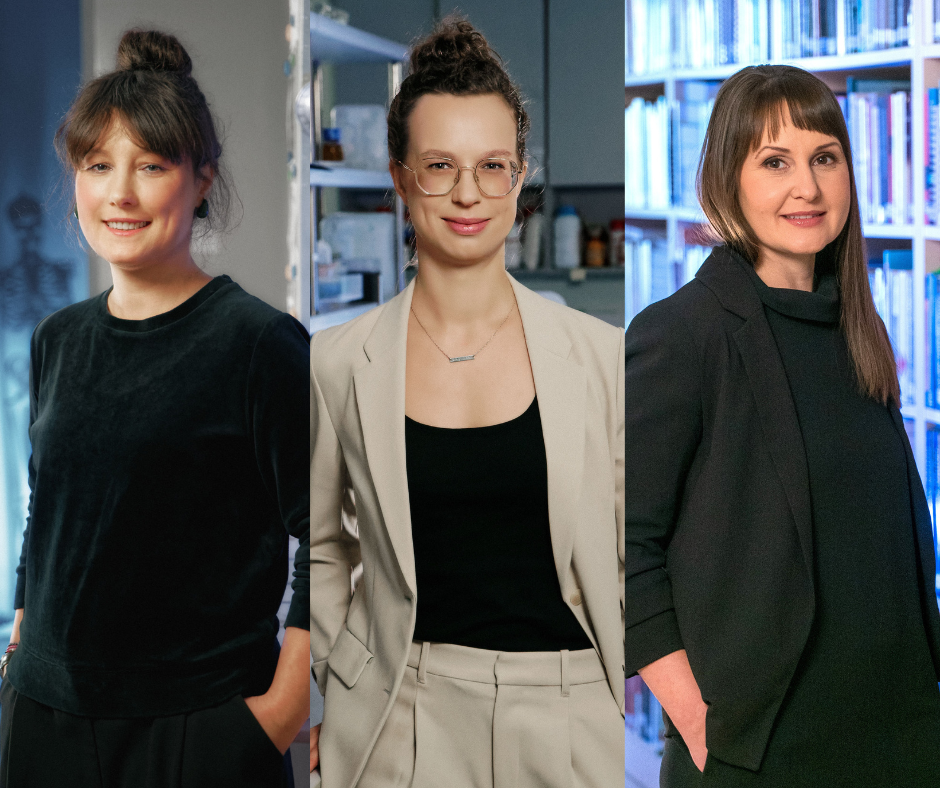Estonian researchers Mari Tõrv, Kadri-Ann Pankratov and Marju Himma are awarded with the Baltic Women in Science fellowships, within the program co-organised by the Baltic National Academies of Sciences and National Commissions for UNESCO.
They receive the fellowships of €7,000 in recognition of their research so far and to support further research in their scientific field.
The joint award ceremony for the Baltic laureates will take place next Tuesday 12 November in Vilnius and will broadcast live at website https://www.lma.lt/live-broadcast.
Dr Mari Tõrv, Associate Professor of Archaeology at Institute of History at University of Tartu and Research Fellow in Analytical and Physical Chemistry at Institute of Chemistry in the same university, is awarded as the PhD in the field of Natural Sciences, Engineering and Technology, Medical and Health Sciences. Her research delves into the biological and cultural diversity of ancient humans, emphasizing the duality of human body. “It is both a historical and cultural construct as well as a biological and physical reality. As an archaeologist, I focus on studying past culture of the life and death through the remains of ancient humans. While biomolecular archaeology has been extensively applied to the study of past ways of life, its application to the study of ancient mortuary rituals has been limited. At the same time, without an understanding of the end-of-life rituals, a grasp of human nature in time-space remains incomplete. This is why the study of death, a taboo subject in the Western world today, is essential,” told Mari Tõrv.
Kadri-Ann Pankratov, Junior Research Fellow in Technology at Institute of Technology at University of Tartu, is awarded as the Doctoral Candidate in the same fields. Her ground breaking research focuses on bio-inspired robotics. While conventionally, robots are mechanical machines connected by wires, her goal is to develop a moth-inspired artificial “circulatory system” for robots which mediates communication and energy transfer and enables growth. “This allows to use the robots in a much wider range of applications in the future, as well as to adapt to changing situations, for example in unknown environments or disaster site search-and-rescue,” said Kadri-Ann Pankratov.
Dr Marju Himma, Associate Professor of Journalism Studies at Institute of Social Studies at University of Tartu, who is also known for the remarkable research popularization and public outreach, is awarded as PhD in the field of Social Sciences. In her research she tests the theoretical concept and applicable model of deliberative science communication that research groups and science administrators can use in practice. According to her, science communication has for long time focused on the media-centred, so called deficit model, meaning that scientists communicate study results to fill the knowledge gap in society. “As a result, there has been mainly one-way communication , eroding trust between science and society and possibly contributing to alienation from an evidence-based worldview. It is therefore important to move towards deliberative communication, that put the needs and interests of the receivers in the centre and delivers knowledge meaningfully and impactfully in dialogue,” said Marju Himma.
Tarmo Soomere, President of the Estonian Academy of Sciences emphasized, that the involvement of women scientists working in the Social Sciences in this fellowship contest has become a link between the classical sciences and society. “Differentiating between scientific fields according to where it is easier and harder for women scientists to succeed should be leaved to the past,” he said. “Talented and successful women scientists deserve to be highlighted and recognised across the whole spectrum of science. Their example inspires and ignites,” he added.
“In today’s world, we increasingly notice how different fields of science interact, giving rise to innovation and a new level of quality within the world of science. Our laureates are living proof of this. I’m very happy that a decision was made to include social sciences into the Women in Science Baltic Fellowship. In Estonia, there remains one small yet important step to take - to include the humanities,” said Kerli Gutman-Normak, Secretary-General of the Estonian National Commission for UNESCO.
A total of 29 women scientists applied for the three fellowhips, 21 in the fields of Natural Sciences, Engineering and Technology, Medical and Health Sciences (including 11 PhD students and 10 PhD-s) and 8 in the Social Sciences.
The aim of the joint fellowship is to support and ignite young women scientists in their pursuit of a career in science in the Baltic States. Estonian fellowships are funded by the Ministry of Education and Research.
Watch from the videos, how the laureates are introducing their research projects.
